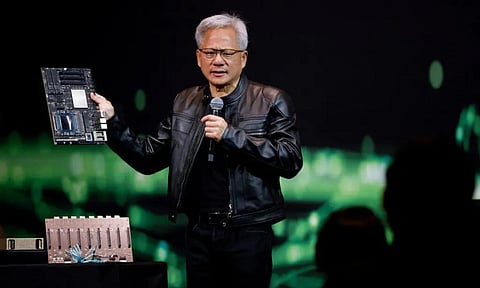

• The Trump administration announced last week that it would allow China to purchase advanced artificial intelligence chips from the tech giant Nvidia. The decision, a reversal of the administration’s past restriction on chip sales, is a profound mistake.
It cedes the United States’ greatest point of leverage in AI: control of the global computing power supply chain. Trump claims to champion American tech, releasing an “AI action plan” this week. But permitting these chip sales threatens American dominance in AI, undermines US tech companies and risks our national security — all in favour of one chipmaker’s near-term profits.
Computer chips are the lifeblood of powerful AI systems. AI companies compete desperately to buy this hardware; many spend the vast majority of their funding on chips. American chipmakers, including Nvidia, sell more than 10 million of these chips annually. China relies on these chips to aid both its military and its AI companies, but can make only about 200,000 of its own per year, the Trump administration said last month.
In other words, Nvidia’s chips will give China’s AI ecosystem, and its government, just what it need to surpass the US in the most critical arenas. AI technology could soon transform military operations, potentially enabling better hacking and sophisticated drone warfare. Ample evidence suggests that Chinese military suppliers prefer Nvidia chips and use AI systems trained on US chips. The stakes are not hard to grasp: We should not allow American troops and intelligence officers to be targeted by Chinese AI trained on Nvidia chips.
The first Trump administration understood these risks. Trump placed export controls on some chip-making equipment in order to hobble China’s AI chip industry, while the Biden administration — in which I served as the White House special adviser on AI — went further, restricting the sale of additional equipment and of Nvidia’s flagship chip, called the H100. Both administrations accused China of using advanced AI to modernise its military and to commit human rights abuses.
Last year, in response to these restrictions, Nvidia created a chip called the H20, which is designed to elude US export controls so it can be sold in China. The controls focused on processing power, so Nvidia gave the H20 chip mediocre processing but large amounts of high-bandwidth memory. That memory allows the H20 to outperform the H100 when running, as opposed to training, AI systems — a process called inference. Inference is becoming increasingly important: One analysis suggests that it will make up more than 70% of AI needs by 2026. This memory, and other components of the H20, could have been used to make H100 chips for American companies.
Before reversing itself, the Trump administration rightly blocked H20 sales to China in April. A White House official said there was “bipartisan and broad concern” about how China would use the chips.
The controls appeared to be working. DeepSeek, China’s most impressive AI company, reportedly failed to follow through on a previous breakthrough because it was cut off from the H20. This weakness was no surprise: DeepSeek’s chief executive had repeatedly admitted that restrictions on the export of US chips were the greatest impediment to his company’s future.
But Nvidia’s chief executive, Jensen Huang, lobbied hard for a reversal. To do so, he hyped China’s Huawei chips, claiming they were on par with Nvidia’s and that Huawei could produce them in competitive quantities. He urged the Trump administration to let Nvidia re-enter the Chinese market to stop Huawei from growing more powerful. China’s state media trumpeted Huang’s comments, as did Trump administration officials in justifying their reversal.
But the claim that China’s chips rival the United States’ is false. Huawei simply has not shown that it can significantly increase AI chip manufacturing. Despite Chinese investments of hundreds of billions of dollars in chip manufacturing since 2014, US export controls on chip-making equipment have held back Huawei’s production capacity. The estimated number of chips Huawei can manufacture this year would hardly be enough to fill a single cutting-edge data centre.
Each of those Huawei chips also performs worse than advanced U.S. chips. Huawei chips account for only about 3% of global supercomputing power. If Huawei’s chips were as good as Nvidia’s, there wouldn’t be the overwhelming demand in China for the H20.
The H20 is a very capable chip. It performs substantially better than Huawei’s best chip at inference. Opening the floodgates for H20s to flow into China will revitalise Chinese companies like DeepSeek as they try to supplant US firms in the global market. Some other chipmakers may wonder why Nvidia gets to profit while their wares are subject to US export controls. Worst of all, the H20 decision could fracture the hard-won bipartisan consensus on the need for American AI dominance over China.
The New York Times